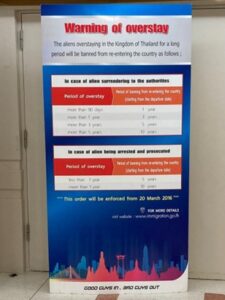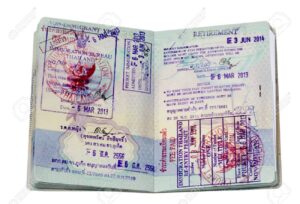Articles

Mum’s the Word: Non-Disclosure Agreements
The overall purposes of an NDA are to protect confidential information, intellectual property rights, customer communications, and temper expectations. NDAs send a message, and they create a legal mechanism to protect ideas and know-how from being ripped off

Did You Notice? Copyright Attributions for Creators
I got a frantic call awhile back from a new client who told me she was facing a “copyright deadline” and was “running out of

Have We Got A Deal? Essential Elements For Any Contract
What’s A Contract? A contract is simply an enforceable agreement, meaning it represents a promise or a set of promises for which the law provides

Thou Shalt Not: Restrictive Covenants And Their Enforceability
Restrictive covenants are contractual agreements that serve to prevent individuals from doing or saying certain things by virtue of their relationship with another party. They

Thailand’s Privilege Visa Program: A Sound Investment, Or Just Another Rip-off?
Expatriates looking to relocate to Thailand have a number of immigration options available to them depending upon their intentions, their resources, and their tolerance for

Writers’ Rights And Responsibilities
If you’ve written a manuscript that’s gotten the attention of a publisher and you’ve been presented with a book publishing agreement, congratulations! You’ve accomplished something

The Case Act: Alternative Adjudication For Copyright Disputes In The United States.
It’s said that Horse Racing and Copyright Litigation are the Sport(s) of Kings, meaning its not for poor folks or those on a budget. That’s

Loose Lips Sink Ships: Protecting Trade Secrets
LOOSE LIPS SINK SHIPS: PROTECTING TRADE SECRETS Most new businesses spring from a good idea; a “Eureka!” moment about how to do something that nobody’s

Kicking And Screaming In The Land Of Smiles
So you’ve made your way into Thailand, legally, and you figure you’re all squared away with the immigration authorities. Well, maybe not. While the vast

Perception And Reality: Global Awareness And Respect For Intellectual Property Rights
The World Intellectual Property Office just released the results of their first-ever global survey of more than 25,000 respondents in 50 countries around the world

Market Forces Or Regulation: Social And Economic Choices For Cannabis Reform In Thailand
The cannabis industry in Thailand has maintained momentum following the previous administration’s decision to remove the plant from the country’s narcotic list in June, 2022.

Words That Hurt
You might have been told when you were growing up that “sticks and stones can break my bones, but words can never hurt me.” Some

Retirement Visas For Foreigners In Thailand
Foreigners and overseas investors contemplating doing business in Thailand must contend not only with the machinations for the legal structuring and formation of their business, but also with the requirements and formalities concerning their personal, physical presence in Thailand as well. Whereas the former issues are overseen by the Ministry of Commerce, the latter fall within the purview of the Department of Immigration. Although in most instances foreign investors running a business in the kingdom will invariably need both a non-immigrant visa as well as a work permit, certain others may benefit from a so-called “retirement” visa discussed below.

IPR Enforcement In Thailand’s CIPITC
Many intellectual property rights holders and practitioners outside of (or even inside of) Thailand with whom I speak are surprised to learn there’s a specialized court system here that focuses specifically on IPR enforcement by adjudicating disputes, including infringement and invalidity issues. Launched in 1997 in an effort to attract foreign trade and investment by ensuring “convenience, expediency and fairness of proceedings”, the Central Intellectual Property and International Trade Court (CIPITC) presently has national jurisdiction over civil and criminal cases involving patent, trademark, or copyright offenses and infringements.

Thai Corporate Structures For Overseas Investors
Thailand’s decision to de-criminalize cannabis in June 2022 prompted a new wave of foreign investment into the kingdom, as entrepreneurs from around the world sought to get in on the action while the getting was good. The past year or so has seen a free-for-all of market activity, resulting in thousands of new business formations for cannabis dispensaries alone. Though heavily politicized heavily during the recent national elections, doors into the market remain open (at least for the time being) for speculators interested in growing, processing, or distributing cannabis on a commercial basis in Thailand. Various types of business structures are available to foreign investors for such purposes.

The value of an MOU
Business negotiations in Asia, particularly those involving parties of different nationalities, usually involves several meetings over an extended period of months, as well as an ongoing exchange of communications in between. The process will usually take longer and may seem more drawn out than would be the case if, for example, both parties spoke the same native language and lived in the same city. The more people that are involved in such negotiations, the greater the likelihood of some misunderstanding by someone about what has been discussed or agreed. A helpful tool to ensure that discussions stay focused and moving forward is the Memorandum of Understanding (MOU).

U.S. Visa Requirements For Foreign Music Artists
Recently, a band I know from of in Taiwan was excited to receive an invitation from an event organizer to join the line-up of a big 3-day music festival in the United States. Like many Asian musicians, these guys are keen to tap into the U.S. market and they hoped they could also build in some other gigs before and after the festival in order to maximize their exposure on the ground there. Unfortunately, a misunderstanding between the parties concerning U.S. immigration requirements and procedures caused the band’s management to decline the invitation.

Home Taxation For Foreign Expatriates
Expatriates doing business in Asia have to contend with local financial reporting requirements in their foreign countries of residence including personal income tax reporting and, where applicable, business income resulting from their operation of a foreign-registered company. Depending on the jurisdiction, these requirements may either be straightforward and uncomplicated, or cumbersome and convoluted; it can sometimes be a lot to deal with. But it’s important that while doing so, expatriates not overlook any attendant reporting requirements back in their home countries. Although most countries around the world exclude foreign-sourced income from their citizens’ reporting requirements, certain others (most notably the United States) have altogether different requirements that must not be overlooked.

Business Presentations In Asia: Tips For Effective Communications
So, imagine you’re scheduled to give a presentation somewhere in Asia that you’ve never been before. In fact, it’s the first time you’ve ever been anywhere in Asia at all. Anyway, further imagine it’s an international business conference and you’re scheduled to give a 15-minute presentation on a stage in front of a large multi-lingual audience. Imagine it’s also your first time attending this particular event and that you’re not familiar with either the composition of the attendees or the flow of presentation, but that you want to make a good impression. Here are some simple guidelines for making more effective business presentations that too many people often overlook.

Do Intellectual Property Rights Last Forever?
Intellectual Property Rights (IPR) refer to the body of legal protections available to authors and creators for their inventions and works – most notably patents, trademarks, and copyrights – which extend exclusive rights in their favor for limited periods of time as a form of limited monopoly incentive to continue developing and sharing their output with the rest of us. A question I’m often asked by creators is how long, exactly, those various terms of protection last, and whether their heirs can benefit from them. “It depends” I tell them. “And yes, of course!”

Responding To Infringement Allegations In The Workplace
Many companies nowadays find themselves accused at some point of having infringed somebody else’s intellectual property in the course of their operations. Such allegations may certainly

Territoriality In Intellectual Property Rights
Creators and legal practitioners are sometimes confused when they think about intellectual property rights in global terms. Although its true that creators retain so-called “global rights” to their works unless and until they are assigned or transferred territorially, it does not follow that rights owners immediately or automatically receive the benefit of protection for their works everywhere around the world from the moment they are created. Yet mechanisms do exist to facilitate such protection and related trade involving intellectual property rights amongst different jurisdictions.

Using (Other Peoples’) Intellectual Property in the workplace
Many businesses are built around intellectual property that they create themselves, whether ideas for better products or services, or new content that’s never existed before. But virtually every business enterprise regularly uses somebody else’s IP in the course of their operations. Most of this use involves copyright, simply by virtue of our daily activities. It’s virtually impossible to go through your business day without making some use of another person’s copyright, and it’s almost impossible to prevent it from happening technologically. That’s why copyright owners seek to control the authorized use of their works by imposing certain “road rules” affecting their use.

Intellectual Property Rights For Start-ups And Entrepreneurs
Start-up businesses are typically based off of an idea, maybe for making a better product or providing a better service or the creation of some new content. Ideas and creative expressions are legally protected around the world by various kinds of intellectual property (IP) rights, which serve to protect against their unauthorized use. Although IP rights vary somewhat in terms of their scope(s) and duration, they may perhaps be thought of as different fingers of a common hand serving the same underlying purpose.

Entertainment Lawyers: An Indispensable Asset for Creative Talent
Clients in the entertainment industries often face multi-faceted concerns. In the best of times, they will be monetizing their talents and responding to commercial opportunities. At other times, they may be accused of wrongdoing, or be the victim of wrongdoing themselves.
An entertainment lawyer may therefore be the best investment creators can make in themselves.

